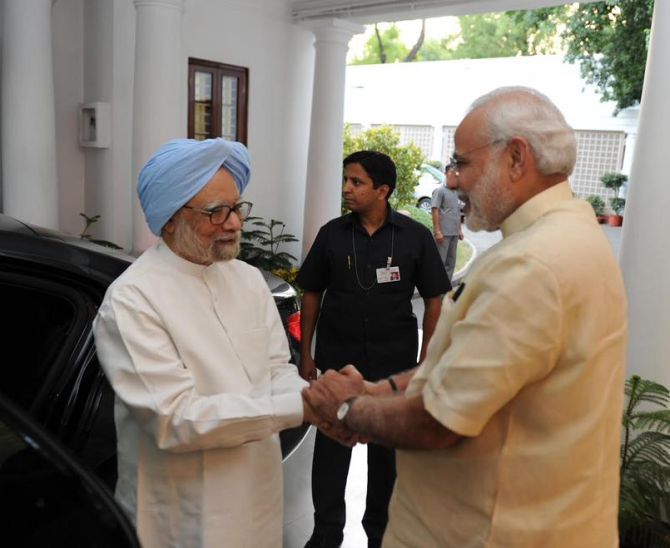'If anyone is able to understand the importance of Modi's endeavours to revive the economy -- even against opposition from sections of his own saffron brotherhood -- it is the former prime minister,' says Amulya Ganguli.

It is sad to see Manmohan Singh join Sonia Gandhi to describe Narendra Modi's development agenda as a smokescreen for his suspected communal agenda.
If anyone is able to understand the importance of Modi's endeavours to revive the economy -- even against opposition from sections of his own saffron brotherhood -- it is the former prime minister.
But the latter apparently remains so grateful to his party president for having elevated him to a position which he knows he could not have attained on his own steam that he unhesitatingly endorses whatever she says without waiting to consider the rights and wrongs of her views.
As is known, this unthinking support has been evident throughout his prime ministerial tenure. Whether it was to let then telecom minister Andimuthu Raja continue in office despite suspicions of his wrong-doing, or agreeing to let the census authorities start collecting caste data again after 1931, Manmohan Singh acted blindly at Sonia Gandhi's behest.
In only one case did his subservience cause him great embarrassment -- that was when the ordinance which the Cabinet had drafted with the Congress president's approval to exonerate convicted criminals with Lalu Yadav in mind, was torn up by Rahul Gandhi. But, even in that case, it was the family which prevailed and not Manmohan Singh's good sense.
However, the greatest blow which he suffered when Sonia Gandhi insidiously ensured that the economic reforms would be scuttled through the snide comments and initiatives of the crypto-Communists in the National Advisory Council led by her, one of whom, Aruna Roy, bemoaned the government's emphasis on growth.
There is little doubt that Sonia Gandhi was behind the government's 'mistake,' as P Chidambaram later said, of 'taking the foot off the accelerator of reforms.'
It was a fatal move for which the party paid a heavy price in the last general election and is likely to continue to pay in the years to come.
The reason why Sonia Gandhi blocked the reforms is not far to see. It was the fastest ever reduction in the rate of poverty between 2005-2006 and 2011-2012, according to the present chief economic advisor, Arvind Subramanian, which persuaded her to scupper the reforms since the credit for this improvement in the economic situation would go to Manmohan Singh, leaving the crown prince Rahul high and dry.
The docile Regent who was only expected to keep the seat warm for the heir-apparent was acquiring a high status of his own.
It is not surprising, therefore, that the Congress president is continuing her opposition to reforms -- this time directed against Modi -- because she is aware, despite her lack of knowledge of economics, that 'fast GDP growth,' as Subramanian had noted, leads to poverty reduction.
There is no way, therefore, that she can allow Modi's 'Sabka Saath, Sabka Vikas' programme to succeed since once the reforms make a perceptible impact on the levels of poverty, the Congress is doomed.
It doesn't seem to matter to her that the country will suffer if her plans succeed. After all, her only objective is Rahul's elevation. There are enough sycophants in the party to go along with her without voicing any objection.
There are also 'Socialist-roaders' in the Congress (like the 'Capitalist-roaders' in pre-Deng Xiaoping China) who still repose their faith in a regulated economy and believe that the opening up of the economy in 1991 was a mistake.
As Mani Shankar Aiyar said, 'I was always Leftist. Economic reforms made me completely Marxist.' In the context of these views in his party, Manmohan Singh conceded that the 'instinctive reaction of many, both in the political class and in the public at large, is to revert to a State-controlled system.'
Unfortunately, Manmohan Singh is now echoing Aiyar by opposing Modi's development initiatives. The man who initiated the reforms in 1991 is turning his back on them.
It is not known how deep and wide is the extent of support in the Congress for this retreat. Does Chidambaram go along with him? Or Montek Singh Ahluwalia (outside the party) who thought that Aiyar never grew up?
There are, of course, others like the diehard 'Socialist' A K Antony, who will be pleased that Manmohan Singh has seen the light. Antony, who once had the gumption to revolt against Indira Gandhi, has since become servile enough to give Sonia and Rahul Gandhi a clean chit, absolving them of any responsibility for the Congress' humiliating drubbing in May last year.
Most of the others, including senior functionaries like Digvijay Singh, do not matter and are likely to remain silent any way, especially when they are in danger of losing their clout in view of the shehzada's preference for people of his own generation.
Manmohan Singh's meek capitulation is a sign not only of his personal failure, but of the fact that party has collectively lost its grit and good sense.
Having become the hostage of a politically inept leadership, which has only the interests of its own members in mind, the Congress has lost the capacity to distinguish between what is good for the country and what is not.
IMAGE: Former prime minister Dr Manmohan Singh with his successor Narendra Modi at 7, Racecourse Road. Photograph: @PMOIndia/Twitter











 © 2025
© 2025